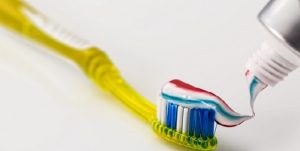 Myths abound when it comes to caring for our mouths! Is there such a thing as brushing your teeth too much or too hard? Could you be flossing too frequently? Below, Dr. E reveals the Top 5 Tooth Truths and exposes some of the biggest mouth myths around while revealing the truth when it comes to achieving the best oral hygiene.
Myths abound when it comes to caring for our mouths! Is there such a thing as brushing your teeth too much or too hard? Could you be flossing too frequently? Below, Dr. E reveals the Top 5 Tooth Truths and exposes some of the biggest mouth myths around while revealing the truth when it comes to achieving the best oral hygiene.
Mouth Myth #1: Harder bristles mean better brushing!
Tooth Truth Revealed: Opt for the softer bristled toothbrush instead! A hard bristled toothbrush can actually harm tooth enamel and gums. In fact, The Wall Street Journal reports that up to 20% of Americans have damaged their teeth or gums by over-brushing. Conversely, gentle pressure and circular brushing motions with a soft toothbrush results in proper cleaning while protecting your teeth, gums, and enamel for overall oral hygiene.
Dr. E’s Advice: Don’t be overwhelmed by all of the latest and greatest options in the toothbrush aisle. Stick with a softer brush for safer, healthier results!
Mouth Myth #2: You can never do too much flossing!
Tooth Truth Revealed: Flossing is one of the most important actions we can take when it comes to optimal oral hygiene. Daily flossing removes plaque and keeps teeth healthy. However, over flossing – that is, flossing multiple times per day on a regular basis — can result in irritated, swollen gums and the wearing down of protective enamel. In addition, over flossing may potentially harm the gum line and unnecessarily expose the surface and root of teeth — making your mouth more vulnerable to cavities and infection.
Dr. E’s Advice: Floss daily but be sure to floss properly! Use clean sections of floss, and hold the floss firmly between thumbs and index fingers while sliding it gently up and down between the teeth and beneath the gumline. Remember that flossing one to two times per day is generally sufficient for good oral hygiene.
Mouth Myth #3: If it’s sugar-free, than it’s OK for my teeth!
Tooth Truth Revealed: Opting for sugar-free drinks and snacks may be better for your diet but that’s not necessarily the case when it comes to your smile. Sugar-free products typically contain high levels of acids that, when consumed in high volumes, can strip away the surface layers of enamel and eventually expose sensitive tooth dentin.
Dr. E’s Advice: As with anything else, moderation is key. Limit sugar-free food and drink products and opt for natural alternatives that are better for your teeth and overall health.
Mouth Myth #4: I have no cavities so my mouth must be perfectly healthy!
Tooth Truth Revealed: A cavity-free mouth doesn’t automatically signal a healthy mouth. The American Academy of Periodontology estimates that roughly three out of four people suffer from some form of gum disease. This is because gum disease is typically painless and may go untreated for long periods. Recognize that red, swollen, and bleeding gums signal gingivitis, the earliest stage of gum disease, and should be accompanied by a trip to your dentist.
Dr. E’s Advice: While a lack of cavities is something to proud of, don’t let this give you a false sense of security. Look for signs of gingivitis and schedule a professional cleaning and exam right away if you notice swollen or bleeding gums. When treated early, gum disease can typically be reversed.
Mouth Myth #5: Fluoride is dangerous to my child’s health!
Tooth Truth Revealed: The use of fluoride, especially in children, has been the focus of debate along with study after study. While over-consuming fluoride could present health dangers, it’s important to realize that fluoride presents no danger to children (or adults!) when used as intended. In fact, fluoride is often added in small, safe amounts to water supplies and dental products in order to effectively prevent cavities and tooth decay.
Dr. E’s Advice: Fluoride is a must! It works in concert with toothpaste to help strengthen teeth and gums while providing maximum protection against tooth decay. Just ensure that children are brushing thoroughly and spitting out their toothpaste (instead of swallowing) during their brushing routine.

